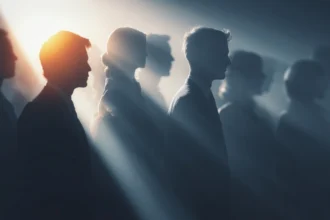
Jewish leaders say they are on edge about a rise in antisemitism from the political left in the U.S.
The recent spate of hate directed at Jewish people includes people asked to leave public events for looking “visibly Jewish,” sharp anti-Israel stances in Congress and descendants of the Holocaust being accused of supporting genocide.
There has been “a slow but steady, unmistakable rise of antisemitism among progressive groups,” Jonathan A. Greenblatt, CEO and national director of the Anti-Defamation League of B’nai B’rith, recently wrote in an op-ed in The Washington Post.
He felt compelled to write the article after a liberal environmental group refused to participate in a voting rights rally because Jewish groups were going to be there.
The antisemitism, say Mr. Greenblatt and others, also manifests itself in incendiary language comparing Israel’s treatment of Palestinians to genocide, a sensitive accusation for those whose ancestors were killed in the Holocaust.
“Antisemitism seems to be something the groups on polar opposite ends, the far right and the far left, can seem to agree on,” said Alyza D. Lewin, president of the Louis D. Brandeis Center for Human Rights Under Law, a civil rights organization.
Of particular concern, said Ms. Lewin, is a rise in antisemitic incidents involving left-wing groups on college campuses.
For instance, Students for Justice in Palestine, a left-wing group opposed to Israeli policies, held a rally in September on the campus of the University of Illinois. A few Jewish students, some wearing yarmulkes, were in the crowd. But they weren’t allowed to stay long.
People who looked Jewish were told they were not welcome.
“Jewish students were asked to leave the rally because they were wearing a yarmulke and were visually Jewish,” the Jewish student organization Illini Hillel at the university’s Urbana-Champaign campus wrote on the group’s Facebook page.
Nearly 70% of Jewish fraternities and sororities members nationally said they had personally experienced or were familiar with an antisemitic attack in the previous 120 days, said a poll in September by the Cohen Research Group for the Louis D. Brandeis Center for Human Rights Under Law.
More than 65% of the Jewish students said they feel unsafe on campus due to physical or verbal attacks. So great is the fear that roughly half of the students have felt the need to hide their Jewish identity, according to the survey.
The antisemitic outbreaks are not confined to college campuses, and some have been violent.
Jewish diners sitting outside a sushi restaurant in Los Angeles were recently pelted with bottles and taunts from passing cars. People waved Palestinian flags and threw bottles at the Jewish diners. A man on a megaphone yelled that Israelis had “killed women” and “should be ashamed of themselves,” according to the Los Angeles Times.
The Anti-Defamation League has documented a surge in antisemitic incidents after the escalation of violence between Israel and Hamas in May. The hate crimes included physical attacks and swastika graffiti.
“And none of the perpetrators were wearing MAGA hats,” Mr. Greenblatt noted.
The most violent attacks on Jewish people over the past decade, including 75% of extremist-related murders, are linked to right-wing ideology, he said. Among the attacks was the 2018 massacre where a right-wing extremist killed 11 people at Pittsburgh’s Tree of Life synagogue.
“I think that today antisemitism is becoming more pronounced, and as is so often the case, only partially because of who Jews actually are and what they do,” said Yehudah Mirsky, a Brandeis University professor of Near Eastern and Judaic Studies and a special adviser in the State Department’s Bureau of Democracy, Human Rights and Labor Affairs during the Clinton administration.
“In America, the physical danger to Jews comes more from the right,” Mr. Mirsky said.
The antisemitism from the left is taking a subtler form of stigmatizing Jewish people but couched in seemingly acceptable arguments for “social justice,” he said.
For example, calls from the left to “defund Israel” have been criticized for igniting even more antisemitic sentiment.
When Rep. Alexandria Ocasio-Cortez, New York Democrat, called for blocking U.S. funding of Israel’s Iron Dome defense missile system, Mr. Greenblatt took to Twitter to condemn it.
“This shameful act also will fuel further campaigns by anti-Zionist activists, including those who took part in the violence or who contributed to the antisemitic climate that saw Jews across the US and around the world attacked during last spring’s conflict,” he wrote.
A spokeswoman for Ms. Ocasio-Cortez, a member of the far-left “Squad” in Congress, did not respond to a request for comment.
“As regards to military aid in general, reasonable people can disagree about American spending priorities,” Mr. Mirsky said. “But when it comes to things like Iron Dome (please note the name), we are talking about defensive weapons systems meant to protect civilians from missiles being fired indiscriminately at their homes, and in the case of Hamas, by an organization which makes no effort to hide its objective of violently destroying Israel.”
Groups criticizing Israel are helping flare antisemitic sentiment through the use of incendiary language such as apartheid and genocide, Mr. Greenblatt wrote.
In a separate post, the Anti-Defamation League called out the left-leaning Human Rights Watch for a report published in April with the title “A Threshold Crossed: Israeli Authorities and the Crimes of Apartheid and Persecution.”
ADL has accused the group of engaging in an anti-Israel campaign but opposed moves to label them as antisemitic.
Eric Goldstein, acting director of Human Rights Watch’s Middle East and North Africa division, said the group shares the ADL’s concern about discrimination based on ethnic identity. But he defended the group’s use of the term.
“Human Rights Watch’s determination that Israeli authorities are committing the crime against humanity of apartheid followed years in which we documented inhumane acts and systemic oppression of Palestinians by Israeli authorities, with the intent of maintaining the domination of Jewish Israelis over Palestinians,” he said.
Ian Katsnelson, a University of Illinois biology student who is Jewish, said being targeted with terms such as genocide and White supremacist is “incredibly confusing because our ancestors were murdered in the Holocaust for not being White enough.”
The increase in antisemitism on the left has occurred despite most Jewish voters leaning Democratic.
Far-left Democrats have suffered criticism for antisemitic rhetoric, including Rep. Ilhan Omar of Minnesota, a Squad member. Ms. Omar suggested that Jewish people are not fully loyal to the U.S. because of their ties to Israel and bemoaned the political influence of the pro-Israel lobby.
Though she was criticized by fellow Democrats, House Speaker Nancy Pelosi shielded Ms. Omar from a formal rebuke by the House.
Ms. Omar declined to participate in this report.
Another recent example of antisemitism on the left was the Washington chapter of Sunrise, a liberal environmentalist group that refused to participate in a voting rights rally in front of the White House “due to the participation of a number of Zionist organizations.”
Sunrise said the Jewish groups are “all in alignment with or in support of Zionism and the state of Israel.”
Sunrise’s national organization disavowed the Washington chapter’s position. The local chapter did not apologize for its stance.
“We arrived at our position and statements through commitments to our hub principles,” including its belief “in the abolition of all oppressive structures and the rebuilding of a new world that will liberate all people, with a focus on transformative justice,” Sunrise DC said in a statement to The Washington Times.
Rabbi Jonah Pesner, director of the Religious Action Center of Reform Judaism, which was one of the groups cited by Sunrise, said that to shun an organization based on assumptions about its beliefs is a form of bigotry.
He said the Action Center supports the right to self-determination in Israel for the Jewish people and the human rights and self-determination of the Palestinian people.
“To be clear, it is not antisemitic to criticize the government or policies of the state of Israel or those of any other nation,” Rabbi Pesner said in a statement. “When groups or individuals demand that all Jews be held accountable to Israel’s actions, or even its mere existence, the line is crossed into antisemitism.”








